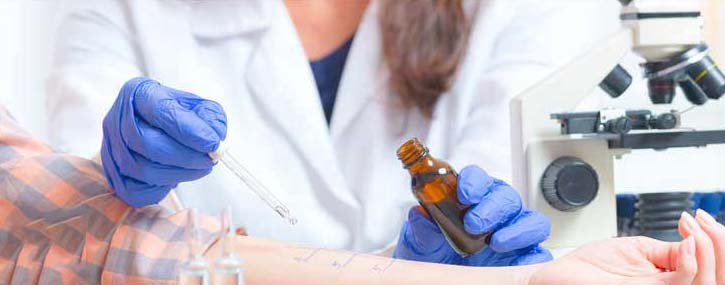Essential Questions to Ask Your Allergist
Dr. Jon E. Stahlman, MD, and our team of healthcare professionals at the Allergy & Asthma Center can test, diagnose, and provide comprehensive treatment for your allergies. For more information, contact us or book an appointment online. We have 3 convenient locations to serve you in Lawrenceville GA, Atlanta GA and Conyers, GA.


Table of Contents:
What does an allergist do?
Is an allergist the same as an immunologist?
What happens at an allergist appointment?
How do they test for allergies?
Diagnosis 101: Your Allergist at the Allergy & Asthma Center Answers Questions About Allergy Testing and Results
An allergist is a medical doctor who has completed several additional years of residencies in both internal medicine or pediatrics as well as allergy and immunology. This means they have extensive knowledge of all aspects of allergies, including symptoms, allergen triggers, and the severity of reactions. They will work with their patients to understand the symptoms, hypothesize what the triggers and allergens could be, perform allergy tests as needed to determine what the allergens are, and gauge the severity of the reaction.
This will enable them to build a unique, personalized treatment plan for their patients that will provide preventative treatment methods and reactive treatments. Preventative treatments include avoidance of the allergens that cause the reactions, allergy shots, and other forms of therapy that can help the patient build up an immunity to the allergen. Reactive treatments are used when an allergen can’t be avoided, or for when accidental exposure happens, this includes oral medications, inhaled medications for anaphylaxis reactions, and an epinephrine shot to provide an immediate shot of medication for short term relief until emergency medical treatment can be received.
Allergists and immunologists receive the same medical training, although they choose different specialties – allergists focus strictly on allergies, while immunologists can diagnose and treat allergies, but also work with patients who are suffering from autoimmune disorders. Both are medical doctors who have received extensive training in allergy and immunology upon completion of medical school and a residency in internal medicine or pediatrics.
Immunologists may often be referred to as allergists, as allergies are caused when the immune system overreacts to exposure to an allergen. In addition to treating allergy patients, immunologists are also involved in conducting research to help understand and explain why the immune system sometimes malfunctions.
They can work with patients of all ages in the evaluation and diagnosis of immune system disorders in order to help them manage their symptoms and treat the disorder. Patients who see an immunologist for the treatment of an autoimmune disorder will also typically work with additional specialists, such as a rheumatologist, depending on the type of autoimmune disorder.
When you book your appointment with an allergy specialist or allergist, you should ask the clinic if there is anything special you need to do to prepare for your appointment. Most allergists will want you to keep a journal of everything you eat, touch, inhale and come into contact with that could potentially be causing an allergic reaction. The journal should also note any symptoms experienced, when they started, what you were doing when they started, if they got worse, what medication you took for relief and if it provided relief, and how long the symptoms lasted. The allergist will want to review this journal with you, as well as discuss your symptoms and your medical history, to start building a hypothesis for what your allergy triggers might be.
This will help them plan what allergens to test you for in order to determine your exact allergies. Because allergy testing is priced based on how many different samples are tested, your allergist will want to work with a narrowed-down list to pinpoint what your triggers are. Prior to testing, your allergist may suggest trying to avoid exposure to some common allergens, as well as anything through your journal that seems to be causing consistent reactions.
There are a few different types of allergy tests that can be performed in order to pinpoint the allergens that a person is reacting to. The most common type of allergy test that is performed is a skin test. Within the skin test, there are a couple of different methods of tests that can be performed. A skin prick or scratch test is the most common allergy test used. This involves exposing the skin to a small amount of an allergen and then gauging the reaction that the skin has, if a reaction occurs.
This type of test can be performed on up to 50 different substances at a time, making it a quick and efficient way to test for multiple different allergens. Any spots that leave a mark will be analyzed to determine the extent of the reaction. A skin patch test is another form of skin test that involves placing larger samples of an allergen, called a patch, onto the patient’s back or arm for up to 48 hours.
After that time, the patch will be removed, and the skin will be analyzed to determine if an allergic reaction was present. Again, the severity of the reaction can be measured by the skin’s appearance upon removal of the patch. Should either of these tests be performed and appear inconclusive, additional testing options are available, however, the costs are significantly higher, and they are not as common.
Your first visit to the allergist is centered on achieving a precise diagnosis, and this section prepares you for that process. During your appointment, your allergist will discuss testing options like the Skin Prick Test, which can safely screen for up to 50 common allergens in minutes, and advanced blood tests (IgE) to confirm specific triggers. You’ll learn what a positive reaction means, how the results correlate with your daily symptoms, and why an accurate diagnosis is the essential first step before a personalized, long-term treatment plan—such as immunotherapy—can be effectively developed.
If you are in need of an allergist, reach out to Dr. Jon E. Stahlman, MD, and our team of healthcare professionals at the Allergy & Asthma Center. We have one goal as a healthcare team: to help you breathe and live better. For more information, please contact us. We serve patients from Lawrenceville GA, Atlanta GA, Conyers GA, Suwanee GA, Duluth GA, Grayson GA, Decatur GA, Brookhaven GA, Lithonia GA and Covington GA.
Check Out Our 5 Star Reviews


Additional Allergy & Asthma Services
▸ Allergy Shots
▸ Allergy Testing
▸ Asthma
▸ Bronchodilators
▸ Drug Allergy
▸ Food Allergy
▸ Insect Allergy
▸ Nasal/Sinus Allergies
▸ Pediatric Allergy
▸ Pediatric Asthma
▸ Skin Allergy
▸ Spring Allergies




